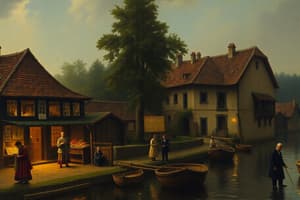Podcast
Questions and Answers
What significant change marked the transition from nomadic hunter-gatherer groups to early agrarian societies?
What significant change marked the transition from nomadic hunter-gatherer groups to early agrarian societies?
- Invention of the wheel
- Shift to settled communities (correct)
- Introduction of metal tools
- Development of written language
Which social structure characterized feudal societies during the Middle Ages in Europe?
Which social structure characterized feudal societies during the Middle Ages in Europe?
- Rigid social hierarchy (correct)
- Egalitarian society
- Democratic system
- Communal ownership
What major innovations emerged during the Industrial Revolution starting around 1760?
What major innovations emerged during the Industrial Revolution starting around 1760?
- Rediscovery of feudalism
- Spread of democracy
- Establishment of anarchy
- Urbanization and growth of cities (correct)
Which movement saw significant growth during the Industrial Revolution?
Which movement saw significant growth during the Industrial Revolution?
In which era did post-industrial societies begin to emerge?
In which era did post-industrial societies begin to emerge?
What distinguishes modern societies from traditional agrarian societies?
What distinguishes modern societies from traditional agrarian societies?
Which factor characterizes modern societies as dynamic and evolving?
Which factor characterizes modern societies as dynamic and evolving?
What is a key feature of post-industrial societies that differentiates them from industrial societies?
What is a key feature of post-industrial societies that differentiates them from industrial societies?
In what way do modern societies stand out from feudal societies?
In what way do modern societies stand out from feudal societies?
How do modern societies differ from industrial societies in terms of social movements?
How do modern societies differ from industrial societies in terms of social movements?
Flashcards are hidden until you start studying
Study Notes
Discovering the Evolution of Societies
From the cradle of early agrarian societies to the digital age, the narrative of human civilization is woven with diverse societies that have shaped our world. Let's explore the historical trajectory of these societies, beginning with their foundations and progressing through the complexities of modern life.
Agrarian Societies
The dawn of agriculture around 10,000 BCE marked the transition from nomadic hunter-gatherer groups to settled communities that cultivated crops and raised livestock. This shift allowed for the development of surplus food production, leading to population growth and the establishment of hierarchical social structures.
Feudal Societies
During the Middle Ages, Europe transformed into feudal societies. Feudalism was a system of land management that gave vassals the right to use land in exchange for military service and allegiance to a lord or monarch. This system created a rigid social hierarchy and shaped the European landscape for centuries.
Industrial Societies
The Industrial Revolution, starting around 1760, introduced mass production techniques, new sources of power, and an urbanization that radically transformed societies. This period saw the rise of working-class movements, the growth of cities, and the birth of modern capitalism.
Post-Industrial Societies
The final quarter of the 20th century ushered in a new era of post-industrial societies. With the decline of traditional industries and the rise of service-based economies, these societies became increasingly knowledge-based and reliant on technological advancements.
Modern Societies
The term "modern society" encompasses the diverse and complex societies that emerged in the 20th and 21st centuries. These societies are marked by rapid change, urbanization, and global interconnectedness. They are also distinguished by an emphasis on individual rights, the rise of new social movements, and a focus on environmental sustainability.
As we progress through these societies, it's important to note that they are not static entities; rather, they are dynamic and interconnected systems that continue to evolve, adapt, and interact. In the face of global challenges such as climate change and socio-economic inequality, societies must navigate new paths that promote resilience, innovation, and collaboration.
Understanding the history of these societies provides valuable insights into the complex and interconnected world we live in today. By exploring the past, we can better prepare for the future, fostering a more inclusive, equitable, and sustainable society for all.
Studying That Suits You
Use AI to generate personalized quizzes and flashcards to suit your learning preferences.




